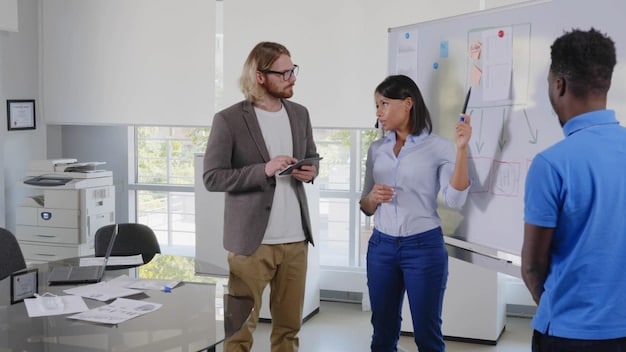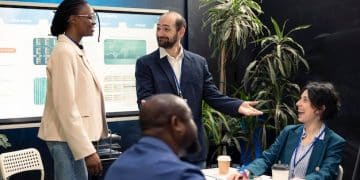Master Effective Communication Skills: Your Guide to Success

Effective Communication Skills: Mastering the Art of Verbal and Written Communication is crucial for career growth. This guide explores techniques to improve clarity, confidence, and impact in both spoken and written interactions.
In today’s interconnected world, the ability to communicate effectively is more critical than ever. Mastering effective communication skills: mastering the art of verbal and written communication can unlock countless opportunities for personal and professional growth. Whether you’re aiming for a promotion or building stronger relationships, these skills are foundational.
From crafting compelling emails to delivering impactful presentations, honing your effective communication skills: mastering the art of verbal and written communication will set you apart. Let’s explore how to improve your verbal and written communication to achieve your goals.
Understanding the Importance of Effective Communication Skills
Effective communication is more than just exchanging information; it’s about ensuring your message is understood, respected, and acted upon. Effective communication skills: mastering the art of verbal and written communication bridges gaps, builds trust, and fosters collaboration.
Why Effective Communication Matters in the Workplace
In the workplace, strong communication skills are essential for teamwork, leadership, and overall productivity. When team members can clearly articulate their ideas and listen actively, projects run smoother, and conflicts are resolved efficiently.
- Improved Teamwork: Clear communication fosters collaboration and ensures everyone is on the same page.
- Enhanced Productivity: When tasks are clearly defined and instructions are well-communicated, work gets done more efficiently.
- Stronger Leadership: Leaders who communicate effectively can motivate and inspire their teams.
- Conflict Resolution: Open and honest communication can help resolve disputes and build stronger relationships.
Understanding the nuances of effective communication skills: mastering the art of verbal and written communication empowers individuals to navigate workplace dynamics and achieve success.

Mastering Verbal Communication Skills
Verbal communication involves conveying messages through spoken words. It’s a dynamic process that includes not only what you say but also how you say it. Effective communication skills: mastering the art of verbal and written communication in this area includes clarity, tone, and active listening.
Key Elements of Verbal Communication
To master verbal communication, focus on clarity, confidence, and engagement. These elements will help you deliver your message effectively and leave a lasting impression.
- Clarity: Speak clearly and concisely, avoiding jargon and complex language.
- Tone: Maintain a positive and respectful tone, adjusting your voice to suit the situation.
- Active Listening: Pay attention to what others are saying, ask clarifying questions, and show empathy.
- Non-Verbal Cues: Be aware of your body language, including eye contact, posture, and gestures.
By refining these elements, you can significantly enhance your effective communication skills: mastering the art of verbal and written communication verbally.
Enhancing Your Written Communication Skills
Written communication is the process of conveying messages through written words. It’s essential for creating clear, concise, and professional documents. Effective communication skills: mastering the art of verbal and written communication requires attention to detail, proper grammar, and a well-organized structure.
Tips for Improving Written Communication
Improving written communication involves honing your grammar, structure, and clarity. Practice these tips to create compelling and error-free documents.
Plan Your Message: Before you start writing, outline your main points and key arguments.
Use Clear and Concise Language: Avoid jargon and complex sentences. Get straight to the point.
Proofread Carefully: Always proofread your work for errors in grammar, spelling, and punctuation.
Tailor Your Message to Your Audience: Consider who you are writing to and adjust your tone and language accordingly.
Mastering these tips can greatly enhance your effective communication skills: mastering the art of verbal and written communication in writing.
The Role of Active Listening in Effective Communication
Active listening is a critical component of effective communication skills: mastering the art of verbal and written communication. It involves fully concentrating on what is being said, understanding the message, and responding thoughtfully. Active listening demonstrates respect and encourages open dialogue.
Developing Empathetic Listening Skills
Empathetic listening involves not only hearing the words but also understanding the emotions and perspectives behind them. To develop your empathetic listening skills, practice the following:
- Pay Attention: Give the speaker your full attention, minimizing distractions.
- Show Empathy: Try to understand the speaker’s feelings and perspective.
- Ask Open-Ended Questions: Encourage the speaker to elaborate and provide more details.
- Summarize and Reflect: Paraphrase the speaker’s message to ensure you understand it correctly.
By honing your active listening skills, you can enhance your effective communication skills: mastering the art of verbal and written communication and build stronger relationships.
Overcoming Communication Barriers
Communication barriers can hinder the effective exchange of information. These barriers can be physical, psychological, cultural, or linguistic. Understanding these barriers and developing strategies to overcome them is essential for effective communication skills: mastering the art of verbal and written communication.
Common Communication Barriers
Identifying common communication barriers is the first step in overcoming them. By recognizing these obstacles, you can develop strategies to ensure your message is clearly understood.
Physical Barriers: Noise, distance, and visual distractions can impede communication.
Psychological Barriers: Biases, assumptions, and emotional states can affect how we interpret messages.
Cultural Barriers: Differences in language, customs, and values can lead to misunderstandings.
Linguistic Barriers: Jargon, technical terms, and language differences can create confusion.

Utilizing Technology to Enhance Communication
Technology plays a significant role in modern communication. From email and instant messaging to video conferencing and social media, utilizing these tools effectively can enhance your effective communication skills: mastering the art of verbal and written communication. However, it’s important to use technology thoughtfully and strategically.
Effective communication in the digital age requires a blend of technical know-how and interpersonal skills. Being adept at choosing the right communication channel for the message improves the chances of it being well-received and appropriately acted upon.
Furthermore, it fosters a more inclusive and collaborative environment where team members can easily share knowledge and insights, regardless of their physical location. Embracing technological tools as enablers of effective communication skills: mastering the art of verbal and written communication not only boosts individual performance but also drives overall organizational success.
| Key Point | Brief Description |
|---|---|
| 🗣️ Verbal Clarity | Speak concisely to ensure your message is understood by everyone. |
| ✍️ Writing Skills | Focus on structure and grammar to write clearly and professionally. |
| 👂 Active Listening | Listen attentively, show empathy, and summarize to truly understand others. |
| 🌐 Tech Use | Employ communication tools wisely to boost interactions effectively. |
Frequently Asked Questions
Techniques include active listening, clear and concise language, non-verbal cues, and adapting your message to your audience to ensure proper understanding.
Focus on clarity, tone, and confidence. Practice speaking clearly, maintaining a positive tone, and being mindful of your body language for optimal results.
Active listening is crucial because it shows you value the speaker’s message. It prevents misunderstandings, allowing for more meaningful responses.
Various digital tools such as email, video conferencing, and instant messaging enable quicker knowledge sharing and encourage more efficient team engagement.
Communication barriers consist of elements such as psychological considerations, varying cultural norms, linguistic differences, and physical distractions that can hinder successful exchanges.
Conclusion
Developing effective communication skills: mastering the art of verbal and written communication isn’t just about talking or writing well; it’s about connecting with others, building relationships, and achieving your goals. By focusing on clarity, active listening, and adaptability, you can become a more effective communicator.
By applying these principles, individuals not only enhance their professional standing but also enrich their personal interactions, fostering a more understanding environment.





